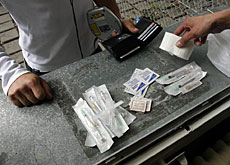Young Swiss put the brake on drink and smoking

Young people are smoking and drinking less, as well as consuming a smaller amount of cannabis than four years ago, according to a study published on Tuesday.
The Institute for the Prevention of Alcohol and Drug Problems, which carried out the research for the Federal Health Office, asked around 9,800 11- to 15-year-olds about their habits.
It found that in 2006 around a quarter of boys and 17 per cent of girls aged 15 drank alcohol at least once a week, compared with a third of boys and 21 per cent of girls of the same age in 2002.
For smoking, 15 per cent of boys (23 per cent in 2002) smoked weekly and ten per cent had a cigarette daily (16 per cent in 2002). A similar drop was also recorded among the girls.
The institute’s Holger Schmid, who led the study, said the lower figures for alcohol and tobacco were mainly due to heightened awareness among parents, youth and the media.
The drop in tobacco consumption was a long-term trend – anti-smoking campaigns were bearing fruit, as were higher cigarette prices, he explained.
“For alcohol use it is the contrary. Until 2002 we had very important increases in consumption and mainly in binge drinking and in 2006 we observe a drop, but the frequency of binge drinking is higher… so figures are going down but not dramatically,” Schmid told swissinfo.
Shops were more aware of under-age drinking and the special tax on highly popular alcopops had made the drink less affordable, he added.
Cannabis
The report also noted a fall in cannabis consumption – stopping the upward trend of the last 20 years.
In 2006 around a third of boys and 27 per cent of girls aged 15 admitted having tried the drug at least once. In 2002 – the highest ever rate – it was 46 per cent for boys and 37 per cent for girls.
This has partly to do with the discussion on revising the cannabis law which made it clear the drug was illegal, said Schmid.
“Parents and schools are doing much more to make the rules and consequences clear when young people don’t stick to the rules.”
However, Switzerland’s rate still places it among the top countries for cannabis use, along with Britain and the United States, according to a study published last week by the United Nations children’s organisation, Unicef.
International comparisons show that cannabis use tends to be high in wealthy countries where drug use is visible, said Schmid.
In terms of international trends for psycho-active substances, although there are no full figures yet available for 2006, Schmid said evidence, particularly from the US, would suggest that the downward trend observed in Switzerland was universal.
Bad reputation?
The Swiss report comes at a time when bad behaviour among young people, especially violence, crime and assaults, has been hitting the headlines. Recent crime figures also suggest that youth crime is on the increase in Switzerland.
Some experts have previously pointed to alcohol as having a strong influence on this type behaviour.
The study found that youngsters aged 15 had relatively easy access to alcohol, taking advantage of friends, acquaintances and even parents to obtain it.
It noted that despite the good results, there was still work to be done. Many youth said they used the substances for fun, but a sizeable number said they were a means of escaping their problems.
Young people need more support, said the study, and training and education also needed to be improved – also a point also picked up in the Unicef report.
Increasing prices and making products less available was helpful in changing behaviour, but measures should be toughened further, the authors advised.
“It’s important that young people realise that it’s more normal not to consume than to consume,” said Schmid.
swissinfo, Isobel Leybold-Johnson
The Institute for the Prevention of Alcohol and Drug Problems carried out the research for the Federal Health Office. It survey around 9,800 11- to 15-year-olds across the country in 2006 about their habits.
The study forms part of an international World Health Organization comparing more than 40 countries, the results of which will be published later this year.
The Swiss part has been carried out for 20 years. The last study was in 2002.

In compliance with the JTI standards
More: SWI swissinfo.ch certified by the Journalism Trust Initiative












You can find an overview of ongoing debates with our journalists here . Please join us!
If you want to start a conversation about a topic raised in this article or want to report factual errors, email us at english@swissinfo.ch.